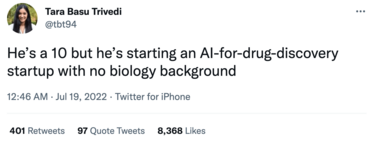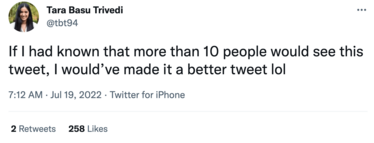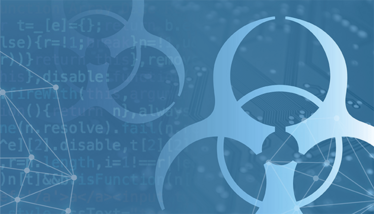
Discovery, Danger, and Duality
Can AI usher in a new age of medicine or is it all hype?
Angus Stewart | | 7 min read | Discussion
Some of us stay well away from Twitter. Others of us dream of scoring a Hit Tweet. Others still, like Tara Basu Trivedi, unintentionally knock it out of the park.


If you didn’t get her joke, please read this helpful explainer. If you got the joke, but felt a little attacked by it, consider for a moment the roiling ocean of emotion and finance bound up in potential applications of AI. In The Medicine Maker, I have covered several truly exciting developments in AI for drug discovery, including Google-owned DeepMind’s publication of its protein folding tool, AphaFold. Viswa Colluru’s dream of drawing up a chemical map of the world is not quite so world famous, but it’s exactly this kind of borderline artistic vision for machine learning that captures the imaginations of profit-seekers and dreamers alike.
Drug Discovery 2041
Turning to another high achiever, Sinovation Ventures CEO and former Google China President Kai-Fu Lee writes in AI 2041, “When we look back in 2041, we will likely see healthcare as the industry most transformed by AI.” He argues that this would in part be due to drug discovery tools, such as AlphaFold, and drug screening tools that can quickly whittle down the list of drug candidates to only the likeliest bets. Backing these claims up, Lee cites Insilico Medicine’s discovery of ISM001-055, a drug that was discovered entirely through AI at one tenth of the cost of traditional drug discovery. That’s not just cool, is it? It’s hot (perhaps even a 10).
But it doesn’t take an empath to see why machine learning sets the feverish hearts of so many investors a-pumping. Exponential tendences in computer power and storage, multiplied by a surge in internet connectivity and the potential for self-propelment in machine learning, have led some observers to speculate on the approach of “singularity” – the moment where AI (and perhaps capitalism itself) achieves takeoff and eclipses all the potentials of human progress. In the final chapter of AI 2041, Kai-fu Lee pours scorn on the dream of the singularity, as the concept deliberately ignores AI’s limitations and the walls it will eventually hit. To use a few ten dollar words: the hype around singularity plays on an anthropomorphic fallacy that wrongly assumes that the quantity of computing power can translate into the quality of human intelligence.
But skepticism here doesn’t stop Lee from issuing effusive, optimistic predictions elsewhere. Every page of his contribution to AI 2041 is liberally peppered with words like “disruption,” “acceleration,” and “revolutionize.” His co-author Chen Qiufan, possessed of an imagination a few shades darker, helps lend AI 2041 a form of critical thinking and caution through the medium of science fiction. In Chapter 7 (a short story called Quantum Genocide), an eco-hacker uses a combination of quantum computing, blockchain, and autonomous weapons to wipe out a swathe of “the one percent” and then bring down the physical structure of the internet itself, throwing a dazed and confused humanity into the great unknown of a new, de-networked dark age…
But surely AI drug discovery can’t lead us to those sorts of extremes, right? Well, to answer that, let’s ask two more questions.
- Can AI drug discovery go exponential?
- Can AI drug discovery be weaponized?

Credit: Collage collated from Pexels.com
FIRST QUESTION: Can AI drug discovery go exponential?
ANSWER: Yes, but not as it stands.
In a review paper published in Drug Discovery Today, Cambridge scientists Andreas Bender and Isidro Cortés-Ciriano demonstrate that it is clinical trials – and phase II clinical trials by far – that place the heaviest burden on drug development costs and attrition rates. Bender and Cortés-Ciriano argue that AI has the potential to support and improve trials, especially through better decision making. However, they say, “Currently the main focus of AI in drug discovery, in many cases, seems to be on speed and cost, as opposed to the quality of decisions.”
In short, the promise of AI holds firm, but you may want to disregard any particularly lofty claims in the next press release from any drug discovery AI startup that you stumble across. AI can improve drug discovery, but, to really overcome human limitations, AI will need to be applied further down the pipeline to address problems that may be more sophisticated than the high speed, brute force number crunching that computers and their algorithms specialize in. Kai-fu Lee devotes one paragraph to this side of drug discovery in AI 2041, noting that robotic tools working round-the-clock in wet labs could surpass the output of human labor, and generate large volumes of useful data. This sounds great, but it does sound more like optimization than an exponential lift-off moment.
SECOND QUESTION: Can AI drug discovery be weaponized?
ANSWER: Unfortunately, the answer is also yes.
In 2020, the Swiss Federal Institute for Nuclear, Biological, and Chemical Protection invited staff from North Carolina's Collaborations Pharmaceuticals to attend one of their international conventions to speak on the potential “misuse” of AI drug discovery technology. Here, astute readers will infer the chilling prospects just as quickly as the recipients did.
In a subsequent paper, the people of Collaborations Pharmaceuticals confess that they had never considered the potential of their AI as a poison and weapon generator. In preparation for their talk, the team took their therapeutic molecule generator and flipped it, so that its machine learning model would reward rather than punish toxicity. In less than one working day, Collaborations’ model had designed over 40,000 lethal molecules, both discovering and surpassing mankind’s deadliest existing weapons of chemical warfare. Collaborations’ team described the experience as a “wake-up call,” and strongly suggested the establishment of professional, academic, and governmental oversight on existing and future technologies for molecule discovery and screening.
“This is not science fiction,” they insist. “We are but one very small company in a universe of many hundreds of companies using AI software for drug discovery and de novo design. How many of them have even considered repurposing, or misuse, possibilities?”
Here, I’ll pull back the curtain slightly and point out that only two of the paper’s four authors are Collaborations employees. One works for the Swiss Defense Ministry, and the other works under two departments at King’s College London: Global Health & Social Medicine, and the Department of War studies, with a specialization in nonproliferation and arms control.
…and breathe.
I hope I didn’t spook you there. Without a doubt, there are whole other blog posts here, just waiting to be penned. Should the computer and pharmaceutical sciences rethink how they handle and share potentially world-transforming technologies? Do investment bandwagons direct popular and economic focus in a way that hamstrings the progress of medicine?
Before the questions sweep us away, let’s bring this blog back down to earth and end on two little lessons.
First lesson: As Chuck D so wisely told us back in 1988, don’t believe the hype – at least where utopian promises about AI platforms for drug discovery are concerned. By all means get excited, but don’t switch off your critical thinking. In fact, that’s a good rule for life in general.
Second lesson: Weapons. The real question here is one of access. Collaborations’ paper outlines some useful practical steps, such as a public-facing API and a hotline for reporting misuse to the relevant authorities. They are just starting points, but they are something. As Chuck D told us in 1989: what we need is awareness, we can’t get careless
Between studying for my English undergrad and Publishing master's degrees I was out in Shanghai, teaching, learning, and getting extremely lost. Now I'm expanding my mind down a rather different rabbit hole: the pharmaceutical industry. Outside of this job I read mountains of fiction and philosophy, and I must say, it's very hard to tell who's sharper: the literati, or the medicine makers.



















